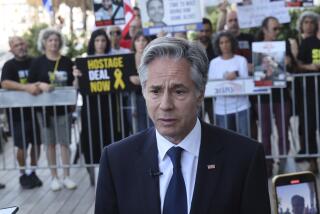Europeans offer Iran a ‘road map’ to negotiations
BEIRUT — A European proposal to ease the West’s nuclear standoff with Iran includes an offer for talks with the Iranians as long as they do not expand their current ability to enrich uranium, Western diplomats say.
Iran has not formally responded to the proposal made last week, nicknamed “freeze for freeze,” which would create a six-week period during which the European Union, Russia, China and the United States would refrain from pushing for additional sanctions against Iran.
Tehran, in turn, would stop adding uranium-enriching centrifuges at its facility in the town of Natanz. However, during the preliminary talks it would not be required to end enrichment altogether, a step the Bush administration has been seeking as a condition for negotiations.
The proposal is meant to head off the confrontation over Iran’s nuclear program, which has been the subject of four United Nations Security Council resolutions sponsored by Western nations and three rounds of sanctions as well as escalating rhetoric that has contributed to war jitters and record oil prices.
“If it doesn’t work, of course, sanctions are still in mind,” said a Western diplomat in Europe, speaking on condition of anonymity. “Iranians shouldn’t have any illusions because at one point there will be more sanctions.”
European foreign policy chief Javier Solana informally floated a version of the idea to Iranians during talks last year, said a diplomat. Solana submitted a formal and detailed written proposal to Iranian nuclear negotiator Saeed Jalili during a visit to Tehran last weekend, said diplomats, speaking on condition of anonymity.
Jalili told Solana that Iranian leaders would consider the proposal, a diplomat said.
Solana offered Iran a package of political, economic and security incentives in exchange for Tehran halting its enrichment of uranium ore, a process used to create fuel for a power plant but which can also make fissile material for an atomic bomb. The U.S. and the West, along with most arms control experts, suspect Iran’s enrichment program is the cornerstone for a potential weapons program.
Iran insists its program is for civilian energy purposes, and despite U.N. sanctions, it has refused to stop enrichment. The U.S. has been pushing for a fourth round of sanctions, which the Security Council could take up by late July.
A senior U.S. State Department official who works on the Iran issue said that he was unaware of the proposal for six-week preliminary talks, and reiterated that the United States would not join any multiparty negotiations until Iran halted enrichment.
Diplomats called the freeze for freeze proposal a “confidence-building measure” meant to allow talks about holding talks.
“During his visit, Solana suggested a creative or imaginative formula to create confidence to prepare formal negotiations,” said Cristina Gallach, Solana’s spokeswoman, who declined to confirm the details of the proposal.
Diplomats said that Iran would not be offered any formal incentives unless it stopped producing nuclear material. Under the proposal, which diplomats described as a “road map to negotiations,” Iran would have the option to halt enrichment for a six-month period during which more substantive negotiations could take place.
“Nothing serious can start without full suspension,” said a Western diplomat in Tehran, speaking on condition of anonymity. “From our point of view it does not compromise on the essentials -- the suspension requirement for formal negotiation -- while it reduces the political cost of suspension for Iranians.”
“If the Iranian problem is really linked to the suspension, we offer them to sit for free at the table of negotiation,” said the diplomat.
Iranian Foreign Ministry and nuclear officials declined to comment on the proposal. Diplomats say the idea did not gain traction when floated to former nuclear negotiator Ali Larijani last year.
The Western diplomat in Tehran said he was skeptical the Iranians would accept it this year.
But the proposal’s 7 1/2 -month time frame would ride out the term of the Bush administration, which has repeatedly threatened military action to destroy Iran’s nuclear facilities. Some Iranian officials welcomed the offer.
“Any proposal that guarantees uranium enrichment as our legitimate right and postpones another round of sanctions should be welcomed and be a base for negotiation,” said Mostafa Kavakebian, the director of a liberal-minded newspaper and member of the reformist bloc in parliament.
--
--
Times staff writer Maggie Farley at the United Nations and special correspondent Ramin Mostaghim in Tehran contributed to this report.
More to Read
Sign up for Essential California
The most important California stories and recommendations in your inbox every morning.
You may occasionally receive promotional content from the Los Angeles Times.









